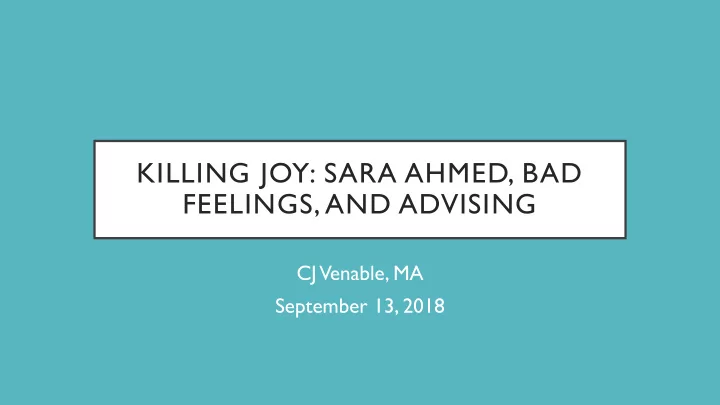

KILLING JOY: SARA AHMED, BAD FEELINGS, AND ADVISING CJ Venable, MA September 13, 2018
WHAT DO EMOTIONS DO? • Emotions make an impression on us—they are not merely internal (to us or to objects) • Emotions circulate in spaces • Emotions are sticky • Ahmed (2015) refers to these as elements of ‘affective economies’ where emotions are produced, hold value, and shape relations between people and things
HAPPINESS DUTY (AHMED, 2010) 1. We should be happy. 2. We should want to be happy. 3. We should be made happy by the right things.
FAILING AT THE HAPPINESS DUTY • What about those who are not happy? • Killjoys—those who cannot get over what is not over • Keep returning to the problems that are not over even when others might want to move on • Point out the problems that others would prefer to ignore • Affect aliens • Those not made happy by the things that should make one happy • Queer Happiness
WHAT DOES THIS LOOK LIKE IN ADVISING?
THE HAPPINESS DUTY IN ADVISING • The Advising Killjoy • Affect Aliens • Advisors who are not made happy by enrollment numbers, test scores, satisfaction measures because they know about deeper issues that remain unresolved • Students who are doing well academically but are unsatisfied with their major because it makes their family happy, but they find it unbearable
OTHER EMOTIONS • Love • Love for the institution means sacrificing ourselves and our students to preserve it over us • Shame • How do our institutions perform shame in light of injustices as a way of covering over and moving on?
BRICK WALLS (AHMED, 2012)
A KILLJOY MAXIM “Don’t look over it, if you can’t get over it” (Ahmed, 2012, p. 187)
QUESTIONS FOR DISCUSSION OR REFLECTION • Have you ever noticed an emotion circulating through a space? Did it seem “contagious”? • Have you experienced the happiness duty in your life or work? Do you accept it, or resist it? • Have you ever been an “affect alien”, not made happy by the right things or made happy by the wrong things? • Are you a killjoy? Would you like to be? • What are some other emotions that get used in advising for a particular aim?
REFERENCES • Ahmed, S. (2010). Feminist killjoys and other willful subjects, The Scholar and Feminist Online , 8 (3), 1-8. • Ahmed, S. (2010). The promise of happiness. Durham, NC: Duke University Press. • Ahmed, S. (2012). On being included: Racism and diversity in institutional life . Durham, NC: Duke University Press. • Ahmed, S. (2015). The cultural politics of emotion (2nd ed.). New York, NY: Routledge. • Ahmed, S. (2017). Living a feminist life . Durham, NC: Duke University Press.
Recommend
More recommend